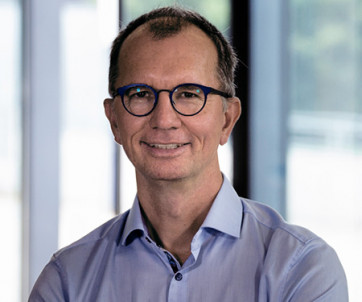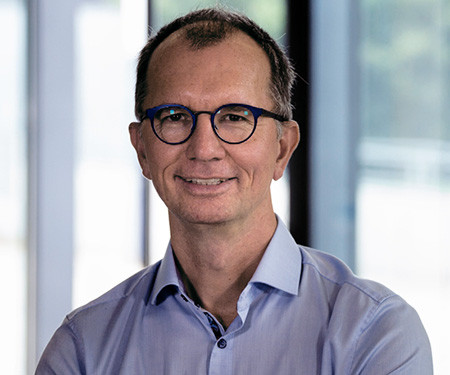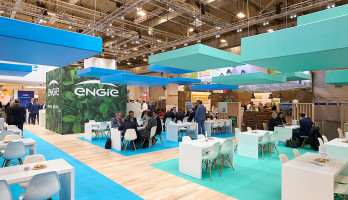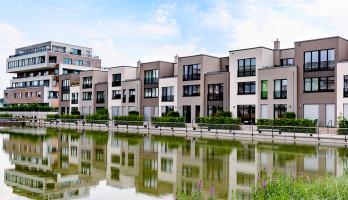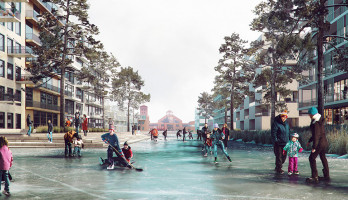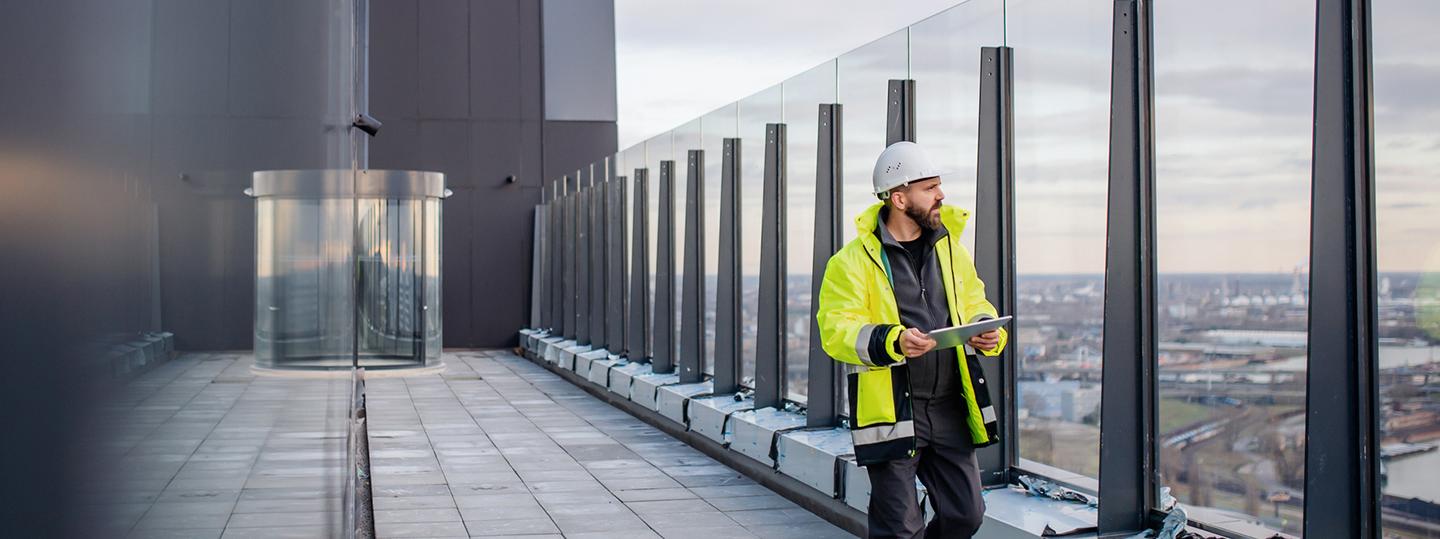
An industry in times of change: Which occupations in the building sector will be important in the future
An interview with Prof. Dr.-Ing. Bernd Döring
Around 30 percent of total CO2 emissions in Germany come from the building sector*. If one takes into account that CO2-intensive products such as cement and steel are used in the construction of buildings and that part of the CO2 emissions attributed to industry are caused by the operation of industrial buildings, the figure is even higher.
Awareness of this connection has increased in recent years, as has the demand for sustainable buildings. In addition, new buildings are generally planned to be "smart," i.e., automated and connected. Against the backdrop of these two developments - the age of climate neutrality and of digitalization - what are the demands for the professions in the building sector of the future? We talked about this with Prof. Dr.-Ing. Bernd Döring, Professor of Building Technology in the Department of Civil Engineering at Aachen University of Applied Sciences.
Professor Döring, what do you see as the biggest changes in the building sector that will concern us in the next few years?
I would name two major topics here: Energy efficiency and digitization. In recent years, we have indeed realized very energy-efficient buildings as subsidized showpieces - but if we take seriously the voluntary commitments that Germany has made to the global community and that have been incorporated into international agreements, we will have to speed up considerably. One indicator can be used to illustrate this: In the past ten years, CO2 emissions in Germany have been reduced by around 15 million tons per year - to achieve the climate targets, we need to bring the reduction to 30 to 40 million tons per year in the next ten years! As far as digitization is concerned, the construction industry is one of the sectors that has been hardly digitized to date - but now the technologies are available that could mean a leap forward here, the key words being BIM, AR and VR. Even if we don't really recognize it yet on a broad scale, this will significantly change planning and building.
Which job profiles will be important in the future? And how do you deal with changing requirements for job profiles as a university of applied sciences?
Both of the above-mentioned topics are incorporated into the students' education. On the one hand, we are increasingly incorporating elements of BIM planning and also energy efficiency and sustainability assessment into the existing courses of study in civil engineering, architecture and facility management. In addition, since 2018 we have offered the new bachelor's degree program Smart Building Engineering (SBE) at the FH Aachen, which focuses precisely on this: Emphasizing building technology subjects that delve into the issues of energy use in buildings, in conjunction with user-oriented automation and digitalization of operations (i.e., "smartification") as well as digital planning techniques and a basic knowledge of architecture. This provides us with a tailor-made offering for the current challenges.
How do you integrate market and employer requirements into the development of new degree programs?
Particularly as a university of applied sciences, we are in constant exchange with companies in the sector, including public administration, in order to adapt our "product", namely the training services for future engineers, well to the needs of the market.
In concrete terms, this can be demonstrated by the example of the new SBE degree program: Companies in the region have shown in joint discussions that there is a shortage of qualified young people precisely in this area. Workshops were then organized with university and company representatives to bring together the needs and the possibilities of the university and finally to develop a curriculum. In the further course, exchange rounds were then held again and again to stay in conversation. It is noteworthy here that the companies set up a foundation to promote this very course of study and provided it with funding. Of course, universities are free to conduct their own research and teaching, but as a university we see this as a special obligation to present our activities and take into account the needs of employers in the further development of our teaching.
Germany is traditionally known as the land of engineers. And a climate-neutral future will require not only a lot of money, but also a great deal of technical innovation. Is the engineering profession still attractive to young people - how are your student numbers developing?
The number of new enrollments in civil engineering is stagnating or slightly declining at a comparatively high level. At the beginning of the 2000s, we had around 6,000 new students in this field throughout Germany; after a peak of around 13,000 in 2011, we are now at around 11,000. In view of the challenges, this is far too few - at the same time, we are dealing with the energy transition, outdated transport and supply infrastructure, housing shortages, etc., and all of these growing tasks are being served by the market for young engineers, which is not getting any bigger. So there is certainly still "room for improvement" to make the engineering profession more attractive.
It is said that digitization should not only make buildings smarter, but also more sustainable. Do you agree with that? And how does that affect training?
After all, "smart" is not an end in itself for a building - specific goals are pursued with it. Often the most economical measure for saving energy and thus protecting the environment is improved control: getting just enough heat, cold, light, etc. to the right place at the right time means improving sustainability. In the SBE degree program, we have therefore included significant portions of computer science and measurement and control technology in order to prepare graduates well in this area. In the future, we will work much more with AI solutions, predictive controls and "digital twins", i.e. techniques that could be described as "smart".
Your students are now "digital natives" who have grown up with digital tools, apps, media, etc. Digital tools are tempting because everything seems to work at the push of a button, so to speak. How do you see this, are we losing analog skills through digitalization that engineers should develop - recognizing technical connections, paying attention to plausibility, being able to assess proportionalities?
Personally, I can say that I still attach great importance to hand calculation and want to convey technical understanding, and I also test this in exams. Students should be able to master basic formulas and get a feel for reasonable proportions. I find this mindset in many colleagues as well. If this is given, the use of digital planning tools becomes a "booster" of one's own expertise - otherwise, one can go full throttle down the wrong track.
Building Information Modeling (BIM) has been one of the big topics in construction and building services in recent years. Even if BIM methods are not yet being used across the board in Germany - what technology push will come next, is artificial intelligence the big topic?
I already mentioned the topic of BIM above - yes, it will gradually become established. If the next generation is already familiarized with it during their studies, the hurdles to its use will become lower and lower. And there will be many things that can be linked to BIM in a comparatively rational way: life cycle assessment, because the materials and masses are known; simulation techniques, because the building geometry and physical characteristics have already been entered; improved methods for energy balancing, which are at the same time simpler and more accurate than DIN V 18599; and then, of course, further use of the data in facility management. In that sense, I don't want to be a prophet with regard to a next technology push, but believe that the networking of digital solutions will continue to increase - from the first design sketch, which can be evaluated in terms of energy, to disposal, where you still know at the end of the service life which products were originally used in order to recycle or dispose of them appropriately.
There is a lot of talk about young people seeking meaningful careers. Do you perceive a change? Is sustainability playing a bigger role among students?
Doing something with "the environment" is already a motivation for some. More often, however, I perceive questions about the chances of a secure job during counseling interviews - which, in view of the boundary conditions discussed above, can be answered in the affirmative if the personal capability and willingness are given. The new SBE program still requires some convincing at this point. However, those who get involved will then also experience a personal gain from the fact that they gain a great broadening of horizons from the canon of subjects, which ranges from "Smart Home" to "History of Architecture". This enables them to go beyond the important tools for everyday work and become real problem solvers of socially relevant issues. And yes, that is then also meaningful.
* umweltbundesamt.de/themen
Our Expert
